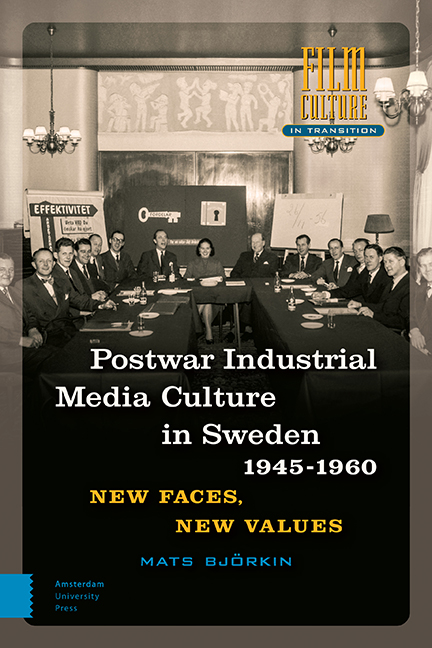Book contents
1 - The Housewife, Film, Television, and the Quiz Show Nerd
Published online by Cambridge University Press: 20 January 2022
Summary
Abstract
Chapter 1 analyses the Swedish social democratic, third-way vision of state, commercial, and cooperative interests acting in harmony, through the examples of TV Boman and Housewives’ Films, and examines how a small but growing consumer-oriented industry sector navigated though the Swedish media ecology with a public service broadcast media lacking commercial alternatives.
Keywords: housewife, television, public service, welfare state
In the 1950s, the largest household appliance company in Sweden was Electrolux. It was created by Axel Wenner-Gren in 1919 to sell modern vacuum cleaners and later on refrigerators, and it soon became a pioneer in sales directly to homes. Its reputation as a company that offered the best in customer service endured for decades. During the immediate years after the end of World War II, the company ceased advertising its products (with the exception of vacuum cleaners and floor polishers) due to an unstable production situation. Electrolux restarted its advertising and marketing work in the early 1950s at the trade and customer goods fairs around the country. Among the products that were marketed in this new start was a combined vacuum cleaner and polisher for floors, furniture, and even for the car.
One of the most popular television shows in the first years of television in Sweden was Kvitt eller dubbelt – tiotusenkronorsfrågan, the Swedish version of the popular American quiz show The $64,000 Question. One of the first winners, on the topic of “world history,” was Kjell Boman, a 55-year-old “sympathetic, slightly curly grey haired” clerk at Electrolux's sales department in Stockholm, recently early retired due to his rheumatoid arthritis. In the eyes of his colleagues, Boman was a humble and easy-going person and a welcome player in the Electrolux bridge club (he even participated in the Friday bridge game the day before the quiz show finale). As a winner of the contest he received a significant sum of money, a car, and a Turkish mat. It was certainly important for an early retired clerk, although he did not approve of the tabloids’ stories of him as poor.
I do not think I’m buying a TV, says the TV star when we ask how he plans to spend the money. I think TV is quite underwhelming. I have not yet received any information about my trip to Italy.
- Type
- Chapter
- Information
- Postwar Industrial Media Culture in Sweden, 1945–1960New Faces, New Values, pp. 33 - 68Publisher: Amsterdam University PressPrint publication year: 2021

